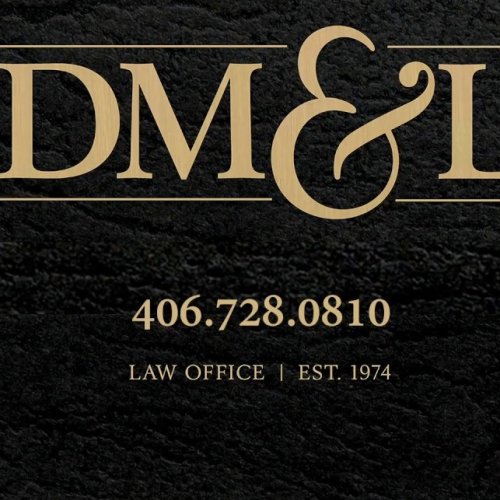Best Adoption Lawyers in Montana
Share your needs with us, get contacted by law firms.
Free. Takes 2 min.
Free Guide to Hiring a Family Lawyer
Or refine your search by selecting a city:
List of the best lawyers in Montana, United States
About Adoption Law in Montana, United States
Adoption in Montana is a legal process overseen by state laws and court procedures designed to create a permanent parent-child relationship between adoptive parents and a child. It is available for children and adults and may involve various scenarios, such as step-parent adoptions, agency adoptions, private adoptions, and relative adoptions. The process seeks to ensure that the adoption is in the child's best interests and protects the rights of all parties involved, including biological parents, adoptive parents, and the child.
Why You May Need a Lawyer
Adoption can be a complex and emotional journey. Many individuals and families benefit from the guidance of a lawyer who understands Montana's adoption laws. Common situations where you may need legal help include:
- Understanding and navigating the different types of adoption options
- Dealing with consent and termination of parental rights
- Resolving disputes between birth and adoptive parents
- Ensuring all documentation and court submissions are correct and timely
- Finalizing the adoption through the court system
- Stepparent or relative adoptions that require special legal procedures
- Overcoming challenges in interstate adoptions or adoptions involving Native American children (which may be governed by additional federal laws)
- Protecting your rights as a prospective birth or adoptive parent
Legal advice helps prevent mistakes that could delay or jeopardize the adoption process, providing peace of mind during every stage.
Local Laws Overview
Adoption law in Montana primarily falls under Title 42 of the Montana Code Annotated. Key aspects include:
- Any adult or married couple may adopt, provided the court finds it in the best interests of the child.
- A person at least 18 years old may be adopted under specific circumstances.
- Consent is mandatory from the child being adopted if they are 12 years or older, the biological parents (unless parental rights have been terminated), and the child's legal guardian (if applicable).
- Consent may not be required if a parent has abandoned the child, had parental rights terminated, or is unfit.
- A home study is usually required, except in stepparent adoptions or those involving a close relative.
- Native American adoptions may invoke the Indian Child Welfare Act, adding federal guidelines to the state process.
- The finalization of adoption involves a court hearing, and once complete, the adoptive parents receive full legal parental rights and responsibilities.
Montana law emphasizes the best interests of the child at every step and includes detailed procedures to ensure this standard is met in each adoption case.
Frequently Asked Questions
Who can adopt a child in Montana?
Any adult, or a married couple together, may petition to adopt in Montana. There are no specific restrictions on marital status, sexual orientation, or financial status, but all petitions must demonstrate the best interests of the child.
Do birth parents need to consent to the adoption?
Yes, in most cases, unless their parental rights have been legally terminated or they are otherwise unfit or unable to provide consent, such as in cases of abandonment.
Can a child be adopted without parental consent?
It is possible in situations where the biological parents have had their rights terminated by court order, have abandoned the child, or otherwise meet exemptions under state law.
Is a home study always required?
Generally, a home study is required to assess the suitability of the adoptive home. However, exceptions exist for stepparent adoptions and some relative adoptions.
What happens during the adoption process?
The process usually involves filing a petition with the court, home study evaluation, obtaining necessary consents, a waiting period, and attending a final hearing where a judge determines if the adoption should be granted.
How long does the adoption process take?
Timelines vary widely depending on the type of adoption and whether all parties cooperate. It can take a few months to more than a year, especially if complications or disputes arise.
Can adults be adopted in Montana?
Yes, adult adoption is allowed under Montana law, generally requiring mutual consent of the person being adopted and the prospective adoptive parent.
How does adoption affect inheritance rights?
Once an adoption is finalized, the adoptee obtains the same legal rights as a biological child, including inheritance rights from the adoptive family.
What is the Indian Child Welfare Act and how does it apply?
The Indian Child Welfare Act (ICWA) is a federal law that provides additional protections in adoption cases involving Native American children. It may require tribal involvement and higher standards for consent and removal from the child's family.
Can I adopt a child from another state?
Yes, but interstate adoptions must comply with the Interstate Compact on the Placement of Children (ICPC), which adds another layer of legal requirements and coordination between states.
Additional Resources
If you are seeking more information or assistance with adoption in Montana, consider reaching out to these resources:
- Montana Department of Public Health and Human Services - Child and Family Services Division
- Montana Courts Self-Help Law Center
- The State Bar of Montana - Lawyer Referral Service
- Local licensed adoption agencies and social service organizations
- Native American tribal child welfare agencies for cases involving Native children
Next Steps
If you are considering adoption in Montana and need legal guidance, the following steps can help you get started:
- Research reputable adoption agencies and gather preliminary information about the type of adoption that fits your situation
- Consult with a qualified Montana attorney experienced in adoption law to review your case and explain your rights and options
- Prepare necessary paperwork and documentation as advised by your lawyer
- Follow your attorney's guidance throughout the home study, consent, and court hearing stages
- Stay informed and ask questions so that you understand every part of the legal process
Having professional legal representation can help ensure your adoption process is smooth, compliant with Montana law, and ultimately successful for you and your family.
Lawzana helps you find the best lawyers and law firms in Montana through a curated and pre-screened list of qualified legal professionals. Our platform offers rankings and detailed profiles of attorneys and law firms, allowing you to compare based on practice areas, including Adoption, experience, and client feedback.
Each profile includes a description of the firm's areas of practice, client reviews, team members and partners, year of establishment, spoken languages, office locations, contact information, social media presence, and any published articles or resources. Most firms on our platform speak English and are experienced in both local and international legal matters.
Get a quote from top-rated law firms in Montana, United States — quickly, securely, and without unnecessary hassle.
Disclaimer:
The information provided on this page is for general informational purposes only and does not constitute legal advice. While we strive to ensure the accuracy and relevance of the content, legal information may change over time, and interpretations of the law can vary. You should always consult with a qualified legal professional for advice specific to your situation.
We disclaim all liability for actions taken or not taken based on the content of this page. If you believe any information is incorrect or outdated, please contact us, and we will review and update it where appropriate.
Browse adoption law firms by city in Montana
Refine your search by selecting a city.










